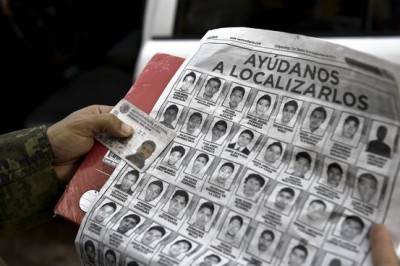Mexican Government Obstructs Investigation into Disappearance of the Ayotzinapa 43

March 27 marked 18 months since the disappearance in the city of Iguala in Guerrero state of the 43 Ayotzinapa teaching students (normalistas), a hideous state crime.
The normalistas had left Ayotzinapa on September 26, 2014, to go to protest deep cuts to education under President Enrique Peña Nieto’s so-called Pact for Mexico, a program instituted to eviscerate decades of gains won by workers. The students were monitored the entire time of their trip by the Guerrero state police. They were fired upon by local police in Iguala, rounded up while a garrison of federal troops stood by, and then disposed of.
The Mexican government continues to try to cover up the circumstances of the disappearance of the normalistas, in which all levels of the Mexican government are implicated.
The official version of the government continues to be that local Iguala police delivered the students to a local gang, who then killed them and burned their bodies in a dump by a river in the neighboring town of Cocula.
Government investigators claimed to have verified that the remains of two students were found at the Cocula site. But in December of last year a group of distinguished experts from the Interamerican Commission of Human Rights known as the Interdisciplinary Group of Independent Experts that studied the case reported that evidence showed that the students were not incinerated at that location.
The Mexican government wants the independent experts to wrap up their investigation by April 30. But the parents of the 43 normalistas seek a six-month extension because they do not trust the government. They also continue to demand the return of their children, refusing to accept that they cannot be located.
According to Felipe de la Cruz, a spokesman for the parents, Mexican Interior Minister Miguel Ángel Osorio Chong had previously committed to extend the independent investigation if the case had not been solved by the end of April. De la Cruz said he expected to make a formal request for an extension to the Mexican Attorney General’s office (PGR) during the first week of April.
The normalista parents charge that the Mexican government has obstructed the efforts of the independent experts. For example, the experts have not been permitted to interview over a hundred persons, including suspects identified by the government, who some allege have been coerced to give statements supporting the government’s line, as well as officials who may be implicated. Although the army was likely complicit in the students’ abduction, that investigative avenue has been shut off.
In order to continue the cover-up of the crime, government authorities have mounted a smear campaign against the independent expert group, questioning its members’ competence, and even their integrity.
Private lawyers have also sought legal recourse against the government for its failure to conduct a thorough investigation and punish those responsible. For example, the attorney for the Center for Human Rights has sued the PGR. In part the suit demands that potentially incriminating videotapes missing from material produced by the Guerrero state judicial authorities to the PGR that were made by local authorities in Iguala on the night of the disappearance be produced, and an investigation into the chain of command and chain of custody of those videos.
Given the course of the government’s investigation its credibility with the Mexican populace remains virtually nonexistent. The government’s hope that if it stalls long enough popular outrage will dissipate has proven to be wishful thinking.
In yet another effort to bury the case the government has sunk to trying to buy off the families of the normalistas. Recently the Interior Ministry confirmed that it will “pay compensation” for the missing students.
A statement by the Office of Human Rights in the PGR confirmed that under the law the government has an obligation to provide care, assistance, support, protection and reparations for the damage or impairment suffered by those whose human rights have been violated. However, the agency said, compensation could not be paid without first assessing the social and psychological condition of the students’ families.
De la Cruz, the families’ representative, responded that they would not accept money from the Mexican government as reparations. He added that this was not the first time that reparations had been mentioned; that previous offer of money by federal and state authorities visiting the parents’ homes had been rejected. De La Cruz said that “they have come to offer money, but they forget that the parents of the 43 missing are not interested in that. We will not sell our children, and the posture of the Ayotzinapa movement remains the same.”
Later at a March 26 rally in Mexico City marking 18 months since the Iguala disappearance, de la Cruz said,
“We call for the existence of a single movement, first to find the truth and do justice. … Full compensation for harm is much more than the payment of compensation; it should include concrete measures of restitution, rehabilitation, satisfaction and especially measures of non-repetition. … We prefer to ask for and receive help from you, the citizenry; that will keep the government from buying off the movement.”
De la Cruz also emphasized that donations were critical because they would fund continuing work by the independent expert group.
The courage, integrity and perseverance of the normalista families and their supporters cannot be questioned. But such atrocities can be prevented only if the Mexican masses tear down the Mexican ruling class and its corrupt and violent state. For its part, the Mexican state is quickly putting in place emergency powers to crush opposition to state policies in the Mexican working class.

